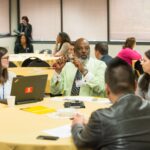
UMBC partnered with the Maryland State Department of Education to bring more than 200 educators, industry leaders, and legislators together for the Maryland Computing Education Summit, the state’s largest gathering focused on computing education. The event was held at UMBC on Tuesday, April 12, 2016.
The Maryland Computing Education Summit began as an annual event in 2013, with the goal of finding a way to offer at least one computer science course to students in every high school across the state, explained Marie desJardins, associate dean of UMBC’s College of Engineering and Information Technology (COEIT) and professor of computer science, one of the leaders behind the event.
Continuing the vision of the original summit, Jack Smith, Maryland interim state superintendent of schools, delivered opening remarks, emphasizing that computer science education needs to be integrated into all levels of K-12 education.
Throughout the summit, attendees participated in sessions on topics such as instructional resources, curriculum for students at different levels, teacher preparation, careers in computer science, and introducing students to computer science outside of the classroom. The session “Diversity and Equity: Why is CS Education Access So Important?” prompted participants to discuss unconscious and societal stereotypes within and about the field of computing.
Jan Plane, director of Maryland Center for Women in Computing and senior lecturer in the University of Maryland, College Park’s department of computer science, showed a graph illustrating the how fields such as biology, chemistry, math, and physics have become increasingly representative of the U.S. population, and how computer science still has significant work to do. “Without fixing the K-12 issues, we cannot fix the computer science pipeline,” Plane noted.
Both desJardins and Plane shared concerns that students often feel they aren’t “good at” or “cut of out for” computer science despite the fact that they haven’t tried it. They stressed that it is important for students to have exposure to computer science from an early age, before taking to heart stereotypes about who computer scientists are, and to have an understanding of the breadth of computing and the ways computing is used in society.
 In one popular session, five UMBC students participated on a panel about their experiences in computing. Beatrice Garcia ‘16, computer science, recalled feeling troubled when she was one of a handful of women in her computer science courses. “Am I behind? Am I on par with the guys?” she would ask herself.
In one popular session, five UMBC students participated on a panel about their experiences in computing. Beatrice Garcia ‘16, computer science, recalled feeling troubled when she was one of a handful of women in her computer science courses. “Am I behind? Am I on par with the guys?” she would ask herself.
Several students mentioned that diversity is a huge issue in STEM fields. Sarah Heiner ‘19, computer science, said that she felt like an imposter during some of her classes, and wishes that one of her technology teachers in high school had been a woman. She did positively reflect on one high school STEM experience, recalling an exciting field trip to the Applied Physics Lab at Johns Hopkins University to learn about the broad ways math can be useful in careers.
Kiante Brantley ‘15, computer science, M.S. ‘16, computer science, emphasized that when educators present information about computer science and careers that use computer science, it is important to present the content in a way that young students find engaging, relatable, and memorable.
Other sessions highlighted resources that educators can use in their classrooms to introduce students to computer science, and gave attendees opportunities to brainstorm ways to integrate computer science principles into their courses.
Core to all these conversations was an understanding that computer science should not be siloed and accessible to only the small percentage of students who might discover it on their own. “We need to make coding a part of our culture,” said UMBC President Freeman Hrabowski, “in the same way that students need to know how to write and think.”





